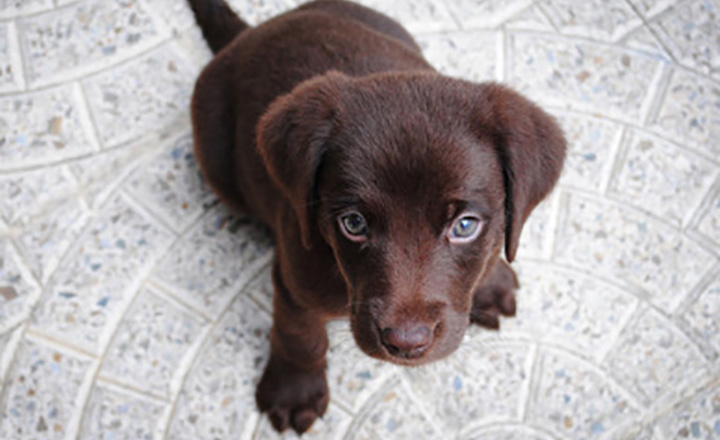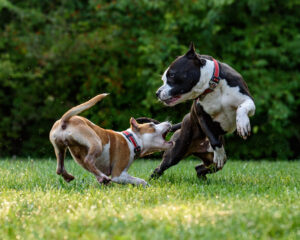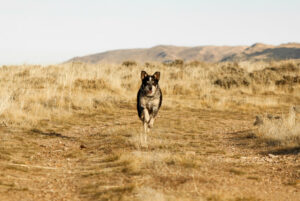
My Puppy Is A Lunatic: Will It Ever End?
Puppies. Terrors. Needle teeth and sharp little claws. But, is there anything more rewarding than successfully raising a puppy? I’m biased but I think not.
Over the years, I’ve happily raised and trained dozens of puppies. Bite inhibition in tandem with potty training is the focus from day one and are the two most important skills you’ll ever teach your puppy, followed closely by a rock-solid recall. We’ll address all three legs of the stool; skip one leg and you’ve got a broken stool.
BITING
Teething and acquired bite inhibition (ABI) go hand-in-hand. How do you stop your puppy from biting? You don’t. I know that sounds counter-intuitive but it’s absolutely critical to respond correctly during this stage of development. Puppies explore the world through their mouths and are seeking feedback on the pressure of their bite. It’s up to us (and other puppies or trusted older dogs) to give puppies this necessary feedback.
 So what’s the big deal? An adult dog who has not received necessary feedback on ABI doesn’t understand their own strength and cannot adjust accordingly. For example, let’s say that you’re visiting a friend with an adult dog. The dog is happy to meet you and settles down at your feet. You stand up to use the bathroom and oops! step on the dog’s tail, causing a normal pain response: biting the thing causing pain. Unfortunately what follows are painful puncture wounds, torn muscles, and a trip to urgent care.
So what’s the big deal? An adult dog who has not received necessary feedback on ABI doesn’t understand their own strength and cannot adjust accordingly. For example, let’s say that you’re visiting a friend with an adult dog. The dog is happy to meet you and settles down at your feet. You stand up to use the bathroom and oops! step on the dog’s tail, causing a normal pain response: biting the thing causing pain. Unfortunately what follows are painful puncture wounds, torn muscles, and a trip to urgent care.
A dog with good ABI may simply snap at the air or gently put their teeth on your leg to communicate their disapproval. Starting your puppy right away with ABI training is imperative to their safety, as well as everyone around them.
It sounds like a huge task but you’re not alone! Dogs learn best from other dogs, so get your puppy enrolled in a puppy class right away. Network with other dog owners and get together for supervised play. Give your puppy feedback too with vocalization (ouch!) and consistency (be prepared to repeat this over and over for a long time.) When giving feedback, resist jerking your hand away and allow the puppy to be the one to back off. Praise them for backing off and they’ll get the message that humans are very delicate and a soft mouth is required!
Teething puppies need lots of things to chew on. Give your puppy a frozen Kong and they’ll adore you forever. In addition, I recommend feeding your puppy from a Kong or puzzle toy instead of a dish. The benefits of this method are twofold: first, you get a break from puppy when you place them in their kennel with their breakfast stuffed in a Kong. Second, they learn to entertain themselves with a fun and delicious toy.
POTTY TRAINING
Crate training. Accidents. Interrupted sleep. I do not recommend potty training a puppy in Minnesota in the winter! I did just that with my last puppy, Ziggy. A spirited little French Brittany, he had a knack for knowing exactly when 4 hours had passed, and then piddling on the floor. Setting timers and tracking their pees and poops definitely helps, but how long can you expect a puppy to hold their bladder and bowels? Here’s a handy guide to help:
Two months, 2 hours but no more than 4 hours while sleeping
Three months, 3 hours but no more than 5 hours while sleeping
Four months, 5 hours but no more than 6 hours while sleeping
Five months, 6 hours but no more than 7 hours while sleeping
Six months, 7 hours but no more than 8 hours while sleeping
Seven months, 8 hours
If you have a small breed puppy, they will need to go outside more often and you can expect a longer potty training period.
Remember that it’s not the puppy’s fault if they have an accident. It’s yours! Punishing a puppy will not get results and may cause them to hide when they have to go. My best advice is to make every experience fun and positive. The best way to do this is with treats. Wherever your puppy is, you’re there too with treats. When a puppy eliminates outside, I go wild. I’m talking about showering them with praise, giving them multiple (but very tiny!) treats, and having an impromptu play session right then and there. They not only went potty in the correct spot but they are also THE BEST PUPPY TO EVER EXIST! Make sure they know, without a doubt, that they’ve done the best thing and they couldn’t be a better puppy if they tried.
But what to do when puppy is peeing on the way outside? Simple. Pick them up directly from their nap and jog them outside. I say jog because the bouncing movement will put pressure on their bladder and bowels and help them realize they really do have to go, and immediately! And yes, it’s very important that puppies get their sleep, but if they’ve been napping for several hours don’t wait until they rouse themselves and have an accident. Adult dogs are expected to eliminate when you let them outside, not when they feel like it. Set your puppy up for success by teaching them to go potty on your schedule.
ROCKIN’ RECALLS
 I know the value of a good recall, but didn’t really know it until a client’s dog slipped his Gentle Leader and was shocked to discover that he was free. FREE! Free? Oh no, I’m free! Off he ran, down the block and straight to his home. But he didn’t stop there and kept moving and didn’t come back again for several hours. We were relieved and lucky that he knew his home and kept checking in to find his people, but some time invested in recall training would’ve saved us several hours of tears and worry.
I know the value of a good recall, but didn’t really know it until a client’s dog slipped his Gentle Leader and was shocked to discover that he was free. FREE! Free? Oh no, I’m free! Off he ran, down the block and straight to his home. But he didn’t stop there and kept moving and didn’t come back again for several hours. We were relieved and lucky that he knew his home and kept checking in to find his people, but some time invested in recall training would’ve saved us several hours of tears and worry.
A great way to start on the right foot is by using their name appropriately. Once you build trust and consistently get their attention with their name, now you can start working on recalls. Start with a squeaky toy and jog away from your puppy, squeaking and using their name with a happy voice. “Ziggy! Come! Good boy, good job, yes!” Shower them with praise and treats. Use appropriate tools, such as a long leash, to ensure your puppy is safe if you’re practicing in an unfenced area. Ask family members or friends to practice with puppy too. As they grow, dogs should feel safe around people and trust humans in general. By asking many different people to help build a solid recall, you’ll be rewarded with a dog who runs towards people instead of away from them.
If they’re getting distracted or are unsure, simply shorten the distance or try luring them using a treat or toy to the spot where you were standing. A successful recall asks that the puppy come to your location, so make sure you delay the reward until you’ve reached the destination. Clapping, toy squeaking, happily calling their name, and looking like a complete idiot will win your dog over every time!
IN CONCLUSION
Teaching a puppy how to navigate this big world is tough, but you’re not alone! Long days at work followed by more hard work with your puppy when you get home is a challenge. Years of rewarding friendship with your dog is more than worth the struggle, so keep moving forward and never stop learning. Ask any puppy-related questions below, and don’t forget to share this article with new puppy parents.